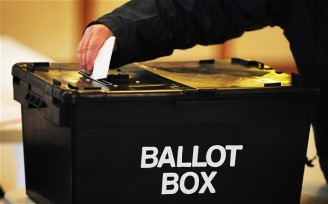Millions of people in the United Kingdom will head to the polling stations on Thursday (7th May) to vote in the 2015 general election. There will however be a large portion of people, whilst eligible, will not cast their vote.
Looking back at the 2010 general election, just 29.7 million out of the 45.6 million people eligible to vote did so. 15.9 million people therefore did not vote.
There may be many reasons for this, such as a disinterest in politics or the election process or competing time commitments. Another key contributor may however be the influence of exposure to conspiracy theories.
Research conducted by Karen Douglas and myself have explored this idea further. We found that when people were exposed to conspiracy theories that argued the government is involved in shady deals and plots, people reported reduced intentions to engage in the political process such as voting. This effect was explained by an increase in feelings of political powerlessness – which is the feeling that one’s action will not impact the political system.
Our research therefore suggests that exposure to government conspiracy theories may increase feelings that one’s action will have little impact, which may lower one’s intention to engage in political behaviours.
People need to vote. If people do not, such disengagement may be detrimental for society and could damage important social systems that are needed for society to function effectively.
Conspiracy theories, with the aid of the Internet, are becoming more popular. Twitter for example, is flourishing with conspiracy theories. This therefore begs the question: Will there be even less people out of the pool of eligible voters going to the polling stations on Thursday than in 2010?
Then, out of those who will not be voting, could conspiracy theories be playing a role? Research to date is suggesting they may be.




http://www.theblaze.com/stories/2012/09/13/fact-check-does-soros-own-an-overseas-company-that-will-count-u-s-votes/
To paraphrase a man far smarter than me…
The world is increasingly filled with horrors and crises which are completely out of your control; there’s nothing you can do; you are utterly powerless; all there is left is to retreat from the world; briefly watch the news, shrug and say ‘Oh Dear’…
‘Oh Dear’.
‘But that’s what they want you to say.’
I SHALL REMAIN A DEDICATED CONSPIRACY REALIST AND A CONSPIRACY PERSON, I CARE FOR NO POLITICAL PARTY WHATSOEVER. WHEN JESUS CHRIST RETURNS, I SHALL NO LONGER HAVE TO BE A CONSPIRACY REALIST NOR A CONSPIRACY PERSON. I AM PATRIOTIC TO NO COUNTRY, I AM PATRIOTIC TO THE TRUTH AND GETTING TO THE CORE OF THIS EXISTENCE. I CONSIDER MYSELF A CITIZEN OF THE HEAVENS, A WAITING THE RETURN OF JESUS CHRIST. ~~~~~~~~~~~~~~~~~~~~HUGS TO ALL MY FELLOW CONSPIRACY FOLKS AT HAND. ONE LINK THAT SEEKS OUR DEATHS:
http://conservativeread.com/warren-buffett-artificial-intelligence-will-decide-whether-humans-live-or-die/
It’s a bit far-fetched to suggest belief in government-related conspiracy theories plays a significant part in people not voting. General apathy and feelings of powerlessness are more likely.
By the way, “Will there be even less people out of the pool of eligible voters…”
Replace “less” with “fewer”.
I don’t vote, I see it as a popularity contest, general disinterest fuels my reasoning. Wrong or Right, I don’t get involved.
Interesting stuff. There’s a whole set of people out there on the net who take some delight in challenging and debunking conspiracy theories. Has anyone ever looked at whether there’s a particular set of psychological traits these people share? Are they affected by exposure to conspiracy theories in the same way as the broad swathe of the population in your study are? If not, why not?
I wonder if it has occurred to anyone: if those in the upper echelons of leviathan corporations (including mass media) & in governments would stop conspiring & lying to the body politic, we would stop promoting what they call “conspiracy theories.” After around 20 years of researching such ideas, tracking their histories, & following money trails, I am not holding my breath.
Pingback: Buffering conspiracy theories with feelings of control | The Psychology of Conspiracy Theories
Perhaps it is time to take some professors at a major university seriously, and admit that the conspiracy is more than a jejune theory:
“The US government does not represent the interests of the majority of the country’s citizens, but is instead ruled by those of the rich concludes a recent study by Princeton University. “… http://www.businessinsider.com/major-study-finds-that-the-us-is-an-oligarchy-2014-4
\\][//
Imagine if you are a Labour voter in an ultra safe tory seat.. or a tory voter in an ultra safe labour seat… or a ukip voter in an ultra safe SNP seat
How likely are you going to vote. If you know their is zero chance the seat will change hands
?
On occasion. Those people might turn out,when their is a national mood of time for a hang in the air. Tired worn out tory party in the 90’s for example. Gave Labour such a large majority they were in shock for a fews years and squandered their mandate.
Now I know it is important to vote and every vote counts. But in the fptp voting system. People can not bother in the near certainty that their vote will not change anything. Not ideal. But no conspiracies.
Hang = change
Auto correct on Android
What jejune bullshit Mr Woods.
Voting is an empty ritual.
\\][//